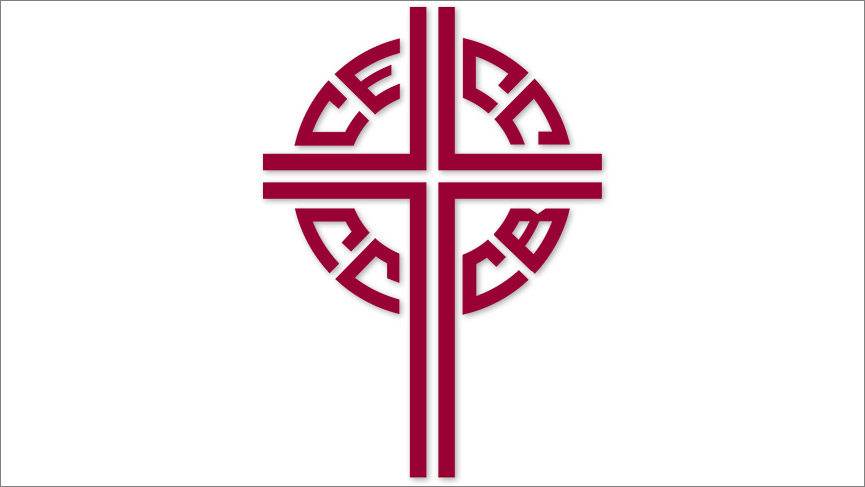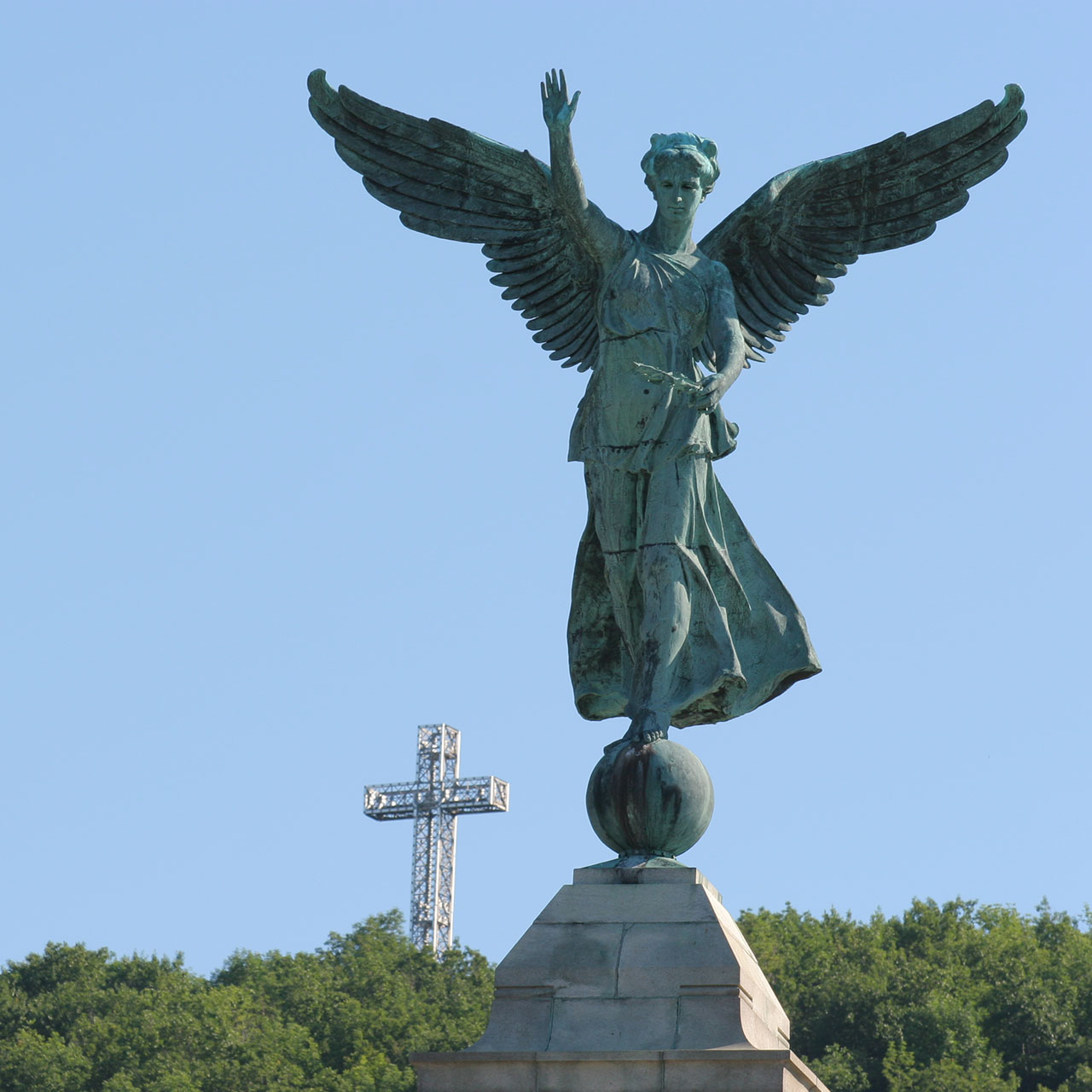MARCH 13, 2022
Quebec Catholic Bishops Appeal for Solidarity with the People Affected by the War in Ukraine.
Nicolet, March 10, 2022 – Convened in plenary, the Catholic bishops of Quebec express their shock and sadness at the war that is currently ravaging Ukraine. They appeal to all Quebeckers, especially Christian communities, to demonstrate their solidarity with the people affected by the war in Ukraine.
First of all, the bishops encourage the offering of prayers for peace and for the people who are suffering in this armed conflict. With this in mind, they welcome the initiatives of prayer and spiritual solidarity begun by parishes and dioceses throughout Quebec. The daily prayers of every person may include the fate of the suffering peoples of Ukraine and Russia.
The bishops also invite Christian communities to assist, as well as initiate, measures to receive the people who have begun to arrive in Quebec seeking refuge and reassurance. The Catholic Church in Quebec has a long tradition of providing hospitality, especially in crisis situations. The present moment calls us to carry on that tradition in conjunction with organizations dedicated to assisting refugees.
Finally, the bishops encourage the citizens of Quebec to give generously to organizations that provide assistance directly to people displaced and affected by the war. Those wishing to contribute to this effort may contact Catholic humanitarian aid organizations, such as Development and Peace (Caritas Canada), which has set up an emergency campaign for Ukraine; the Catholic Near East Welfare Association (CNEWA), which is a papal agency active in Eastern Europe; and Aid to the Church in Need, which assists local churches. In this spirit, the Secretariat of Catholic Bishops of Quebec has pledged a donation of $10,000.
Let us be peacemakers!
FEBRUARY 6, 2022
Letter of the Catholic Bishops of Québec to their Sisters and Brothers on the Occasion of the Reopening of places of Worship on February 7 2022.
The resumption of our activities is an opportunity to recall the duty of the State to respect, promote and protect religious freedom. The Declaration on Religious Freedom made during the Second Vatican Council is very clear on this subject. We make this conviction our own:
The protection and promotion of the inviolable rights of man ranks among the essential duties of government. Therefore government is to assume the safeguard of the religious freedom of all its citizens, in an effective manner, by just laws and by other appropriate means. Government is also to help create conditions favourable to the fostering of religious life, in order that the people may be truly enabled to exercise their religious rights and to fulfill their religious duties, and also in order that society itself may profit by the moral qualities of justice and peace which have their origin in men’s faithfulness to God and to His holy will.
Our churches’ reopening is the result of many efforts by the members of the Table interreligieuse de concertation du Québec, with whom we stand in solidarity. We have coordinated efforts with them to persistently ask the government to reopen worship places as soon as possible. We also insisted that people attending our assemblies be exempted from the requirement of the vaccination passport, aware as we are of the negative effects of its imposition on our communities. We recognize that many faithful believe that this requirement constitutes an intolerable discrimination that deprives unvaccinated people of their right to religious freedom. This exclusion seems to them to be incompatible with the very essence of a community of believers, called to be welcoming, compassionate and open to diversity. On this, we agree with them.
However, in this exceptional pandemic moment, Catholics have a duty to join their efforts to those of all members of society to ensure the safety and health of all, even if some measures affect the exercise of certain freedoms for a while. The Declaration on Religious Freedom speaks to us on this subject. We can read at number 2 of this text:
This Vatican Council declares that the human person has a right to religious freedom. This freedom means that all are to be immune from coercion on the part of individuals or of social groups and of any human power, in such wise that no one is to be forced to act in a manner contrary to their own beliefs, whether privately or publicly, whether alone or in association with others, within due limits.2
We note that the declaration recognizes that “due limits” can be imposed on religious freedom in certain circumstances. Moreover, the Council Fathers also consider necessary to emphasize in number 7 of the same declaration that this freedom is not absolute: it comes with a responsibility for the common good. In the use of all freedoms, the moral principle of personal and social responsibility is to be observed.
In the exercise of their rights, individuals and social groups are bound by the moral law to have respect both for the rights of others and for their own duties toward others and for the common welfare of all. Each should deal in justice and civility with all. Thus, for members of the Catholic community, the expression of religious freedom is not only centred on individual rights and needs, but also concerned for the health of others. This freedom may exceptionally be subject to temporary restrictions for the common good. The same is true for freedom of conscience. Indeed, our conscience does not operate in a vacuum: it is formed in dialogue with different sources of moral wisdom and its decisions must be directed toward others, in solidarity with others.
As Pope Francis recalled in his address to members of the Catholic media on January 28, 2022, “we do not emerge from a crisis alone.”3 For this, we need to work together, together for others, especially those who are needy, and together in the service of truth, which means seeking that which promotes communion and the good of all. As humanity faces the risks to our societies brought on by this pandemic, Catholics recognize that governments not only have the right but, even more, the duty to intervene to ensure the health and safety of all. This is the state’s duty, even if the decisions taken are imperfect and questionable, made at the cost of scientific and political compromise.
While exercising healthy vigilance and our democratic duty to discuss and to question certain decisions, we are challenged by the apostle Paul who reminds us never to stop supporting our rulers with our prayers: First of all, then, I urge that supplications, prayers, intercessions, and thanksgivings be made for everyone, for kings and all who are in high positions, so that we may lead a quiet and peaceable life in all godliness and dignity. (I Timothy 2:1-2) Therefore, it seems reasonable to us in the present circumstances to accept certain compromises that contribute to the safety and health of all. For the moment, we accept that vaccination passports are required to access worship spaces, even if this measure upsets us deeply. However, we remain in contact with government authorities to remind them that this requirement goes against our beliefs and to ensure that it will be lifted as soon as it is safe to do so.
That being said, we would like to affirm the concern of all our Church’s pastors as we strive to accompany and offer support to all those who at this time do not have access to our churches. Whether through individual meetings, by broadcasting celebrations, by celebrating liturgies outdoors or through any other safe means, we want all baptized people to be welcomed and accompanied. In these times, exceptionally difficult for all of us, we unite our prayer to that of Pope Francis: “I ask God that each of us might contribute their little grain of sand, their little gesture of love.”4 In no way do the constraints we encounter prevent us from loving our neighbours, from helping them and from offering them our friendship.
May the peace and grace of our Lord be with you!
The members of our Assembly’s executive committee,
+ Christian Rodembourg, M.S.A.
Évêque de Saint-Hyacinthe
Président de l’Assemblée
+ Paul-André Durocher
Archevêque de Gatineau
Vice-président de l’Assemblée
+ Gérald C. Card. Lacroix
Archevêque de Québec
+ Christian Lépine
Archevêque de Montréal
+ Luc Cyr
Archevêque de Sherbrooke
DECEMBER 7, 2021
Canadian Bishops, Assembly of First Nations, Métis National Council, and Inuit Tapiriit Kanatami Provide an Update on Delegation to Rome
The After careful assessment of the uncertainty and potential health risks surrounding international travel amid the recent spread of the Omicron variant, the Canadian Bishops, Assembly of First Nations, Métis National Council, and Inuit Tapiriit Kanatami have jointly decided to reschedule a delegation to the Vatican in December 2021 to the earliest opportunity in 2022.
NOVEMBER 14, 2021
Canadian Bishops Invite Residential School Survivors, Indigenous Elders to meet the Pope
The Catholic Bishops of Canada are pleased to announce that 25-30 First Nations, Inuit, and Métis Elders, knowledge keepers, residential school survivors, and youth will meet with Pope Francis at the Vatican from December 17-20, 2021, accompanied by a small group of Canadian Bishops.
“The journey towards healing and reconciliation is a long one, but we believe this will be a significant milestone in the Catholic Church’s commitment to renewing, strengthening and reconciling relationships with Indigenous Peoples across the land,” said CCCB President, the Most Rev. Raymond Poisson. “With this delegation, we hope to walk together in a new way, to listen with humility, and to discern the next steps that the Church can take to support residential school survivors, their families, and their communities.”
The delegation has been planned through ongoing dialogue with the Assembly of First Nations, the Métis National Council, the Inuit Tapiriit Kanatami, and other Indigenous leaders. While specific travel plans and itineraries are being coordinated with the delegates directly, representatives from the Vatican have confirmed that the Holy Father will participate in private meetings with First Nations, Inuit, and Métis delegates respectively to hear their personal stories of the lasting legacy of residential schools. Delegates will also have the opportunity to speak with the Holy Father about their hopes and expectations for his eventual pilgrimage to Canada.
In addition to this group of delegates, additional Indigenous Peoples have been invited to participate in the journey, including for a final audience with the Holy Father. Centred around the principles of mutual trust, respect, and a shared desire to move forward for a more hopeful future, the Canadian Bishops and Indigenous Partners have agreed upon the theme, “Indigenous Peoples and the Church: Walking Together Toward Healing and Reconciliation”.
Collectively, the delegation includes participants from across the country, representing multiple faith and linguistic backgrounds. Every delegate brings their own perspective on the history of colonialism and residential schools.
Travel and hospitality costs for the delegation will be covered by the Canadian Conference of Catholic Bishops. Mental health workers will travel with the group, in recognition of the painful sentiments that may be experienced by many delegates.
Additional information on media accreditation and availabilities will be communicated in short order. Information about the delegates themselves will also be shared in the coming weeks, subject to their consent.



